专升本英语考试题
专升本英语试题集及答案
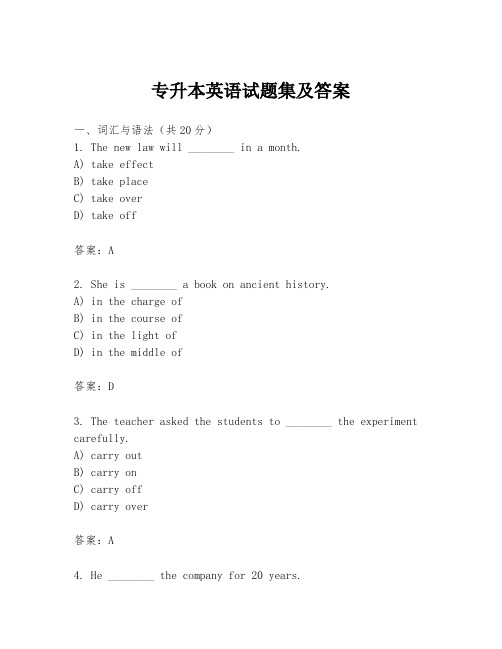
专升本英语试题集及答案一、词汇与语法(共20分)1. The new law will ________ in a month.A) take effectB) take placeC) take overD) take off答案:A2. She is ________ a book on ancient history.A) in the charge ofB) in the course ofC) in the light ofD) in the middle of答案:D3. The teacher asked the students to ________ the experiment carefully.A) carry outB) carry onC) carry offD) carry over答案:A4. He ________ the company for 20 years.A) has worked atB) worked atC) had worked atD) would work at答案:A5. ________ the heavy rain, we had to cancel the sports meeting.A) Due toB) Because ofC) Owing toD) As a result of答案:A二、阅读理解(共30分)阅读下列短文,然后根据短文内容回答问题。
Passage 1In recent years, the popularity of online shopping has grown exponentially. The convenience and variety of products available online have attracted a large number of consumers. However, there are also concerns about the security of online transactions.6. What is the main topic of the passage?A) The growth of online shoppingB) The security concerns of online shoppingC) The variety of products onlineD) The convenience of online shopping答案:A7. Why has online shopping become so popular?A) It is convenient.B) It is safe.C) It is expensive.D) It is time-consuming.答案:A8. What is the concern mentioned in the passage?A) The cost of products.B) The variety of products.C) The security of transactions.D) The inconvenience of shopping.答案:CPassage 2Many people believe that success is the result of hard work and determination. However, some argue that luck also plays a significant role in achieving success.9. What does the passage discuss?A) The role of hard work in success.B) The role of luck in success.C) The definition of success.D) The importance of determination.答案:B10. What is the author's opinion on success?A) Success is only about hard work.B) Success is only about luck.C) Success is a combination of hard work and luck.D) Success is not important.答案:C三、完形填空(共20分)阅读下面的短文,从短文后各题所给的四个选项中,选出可以填入空白处的最佳选项。
专升本英语试题及其答案
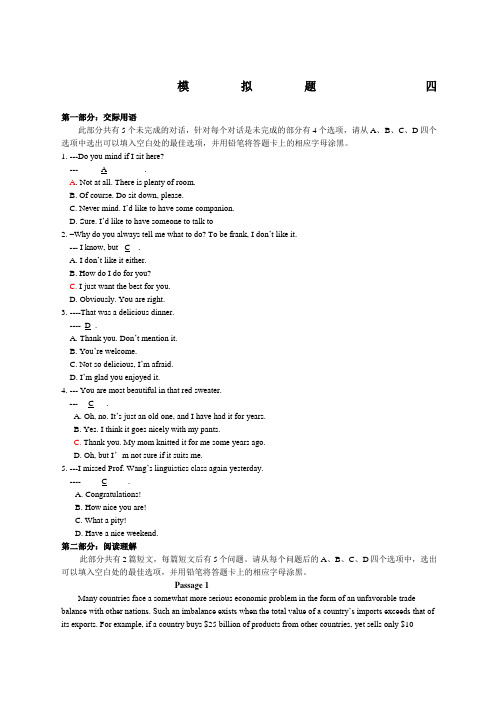
模拟题四第一部分:交际用语此部分共有5个未完成的对话,针对每个对话是未完成的部分有4个选项,请从A、B、C、D四个选项中选出可以填入空白处的最佳选项,并用铅笔将答题卡上的相应字母涂黑。
1. ---Do you mind if I sit here?--- _____A_________.A. Not at all. There is plenty of room.B. Of course. Do sit down, please.C. Never mind. I’d like to have some companion.D. Sure. I’d like to have someone to talk to2. –Why do you always tell me what to do? To be frank, I don’t like it.--- I know, but _C__.A. I don’t like it either.B. How do I do for you?C. I just want the best for you.D. Obviously. You are right.3. ----That was a delicious dinner.----_D_.A. Thank you. Don’t mention it.B. You’re welcome.C. Not so delicious, I’m afraid.D. I’m glad you enjoyed it.4. --- You are most beautiful in that red sweater.--- __C___.A. Oh, no. It’s just an old one, and I have had it for years.B. Yes. I think it goes nicely with my pants.C. Thank you. My mom knitted it for me some years ago.D. Oh, but I’m not sure if it suits me.5. ---I missed Prof. Wang’s linguistics class again yesterday.----_____C_____.A. Congratulations!B. How nice you are!C. What a pity!D. Have a nice weekend.第二部分:阅读理解此部分共有2篇短文,每篇短文后有5个问题。
专升本英语试题库及答案
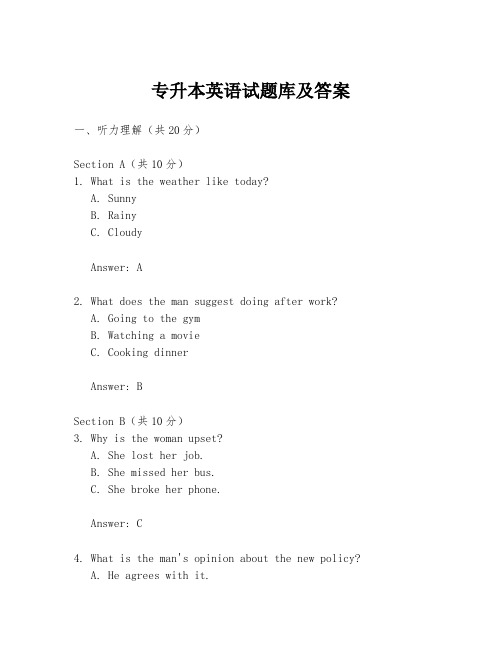
专升本英语试题库及答案一、听力理解(共20分)Section A(共10分)1. What is the weather like today?A. SunnyB. RainyC. CloudyAnswer: A2. What does the man suggest doing after work?A. Going to the gymB. Watching a movieC. Cooking dinnerAnswer: BSection B(共10分)3. Why is the woman upset?A. She lost her job.B. She missed her bus.C. She broke her phone.Answer: C4. What is the man's opinion about the new policy?A. He agrees with it.B. He disagrees with it.C. He is indifferent.Answer: A二、阅读理解(共30分)Passage 1(共10分)In this passage, we learn about the importance of environmental protection and the role of individuals in preserving the planet.5. What is the main idea of the passage?A. The role of technology in environmental protection.B. The importance of individual actions in protecting the environment.C. The impact of pollution on wildlife.Answer: B6. According to the passage, what can individuals do to help the environment?A. Plant more trees.B. Recycle regularly.C. Both A and B.Answer: CPassage 2(共10分)This passage discusses the benefits of learning a second language and the challenges associated with it.7. What is the author's view on learning a second language?A. It is easy and beneficial.B. It is challenging but rewarding.C. It is unnecessary for most people.Answer: B8. What does the author suggest as a way to overcome language learning difficulties?A. Practice regularly.B. Use technology.C. Both A and B.Answer: CPassage 3(共10分)The passage explores the history of a famous landmark and its cultural significance.9. When was the landmark built?A. In the 18th century.B. In the 19th century.C. In the 20th century.Answer: B10. Why is the landmark significant?A. It is a symbol of freedom.B. It is an architectural marvel.C. It is a historical site of a famous battle.Answer: A三、完形填空(共20分)In the following passage, there are 10 blanks, each followed by four options labeled A, B, C, and D. Fill in each blank with the correct option.11. The old man was very _______ to his grandchildren.A. strictB. kindC. indifferentD. harshAnswer: B12. She decided to _______ her career in teaching.A. pursueB. abandonC. postponeD. delayAnswer: A... (Continue with the remaining 8 blanks and their answers)四、翻译(共15分)Translate the following sentences from English to Chinese.13. The company has decided to expand its business overseas. Answer: 该公司已决定将其业务扩展到海外。
英语专升本考试试题
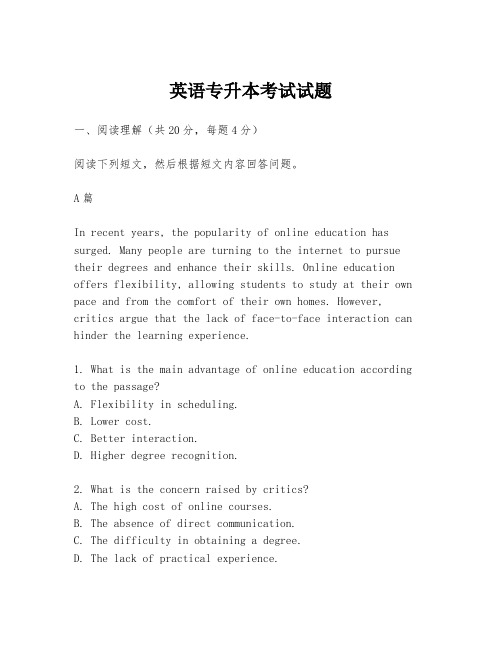
英语专升本考试试题一、阅读理解(共20分,每题4分)阅读下列短文,然后根据短文内容回答问题。
A篇In recent years, the popularity of online education has surged. Many people are turning to the internet to pursue their degrees and enhance their skills. Online education offers flexibility, allowing students to study at their own pace and from the comfort of their own homes. However, critics argue that the lack of face-to-face interaction can hinder the learning experience.1. What is the main advantage of online education according to the passage?A. Flexibility in scheduling.B. Lower cost.C. Better interaction.D. Higher degree recognition.2. What is the concern raised by critics?A. The high cost of online courses.B. The absence of direct communication.C. The difficulty in obtaining a degree.D. The lack of practical experience.B篇The concept of a "smart city" is becoming increasingly prevalent. A smart city uses technology to improve thequality of life for its residents. This includes the use of data analytics to manage public services more efficiently. For example, traffic congestion can be reduced by using smart traffic lights that adapt to the flow of vehicles. Proponents of smart cities believe that they can lead to a more sustainable future.3. What is the primary goal of a smart city?A. To increase the cost of living.B. To enhance the quality of life.C. To attract more tourists.D. To boost the local economy.4. How do smart traffic lights contribute to a smart city?A. By reducing traffic accidents.B. By managing public transportation.C. By reducing traffic congestion.D. By increasing the speed limits.二、词汇与语法(共30分,每题3分)用所给单词的正确形式填空。
专升本英语英语试题及答案

专升本英语英语试题及答案专升本英语试题及答案一、听力理解(共15分)1. 短对话理解(每题1分,共5分)听下面5段对话,每段对话后有一个问题。
从题中所给的A、B、C三个选项中选出最佳选项。
对话1:A: What time is it now?B: It's half past seven.问题:What time is it according to the conversation?A. 7:00B. 7:30C. 8:00答案:B对话2:A: Do you have any plans for the weekend?B: Yes, I'm going to the museum.问题:What is the man going to do?A. Go to the cinema.B. Go to the museum.C. Go to the library.答案:B(剩余对话及问题略)2. 长对话理解(每题2分,共10分)听下面一段较长的对话,对话后有5个问题。
从题中所给的A、B、C 三个选项中选出最佳选项。
对话:A: Hi, Jane! How was your trip to New York?B: Hi, Mike! It was fantastic. I visited the Statue of Liberty and Central Park.问题1:Where did Jane go?A. LondonB. New YorkC. Paris答案:B(剩余问题及答案略)二、阅读理解(共30分)1. 阅读理解选择题(每题2分,共20分)阅读下面的文章,然后回答后面的问题。
文章1:Reading is a great way to relax and learn at the same time. It can improve your vocabulary, broaden your knowledge, andstimulate your imagination.问题1:What is the main idea of the passage?A. Reading is a way to relax.B. Reading is a way to learn.C. Reading is beneficial for both relaxation and learning.答案:C(剩余文章及问题略)2. 阅读理解简答题(每题5分,共10分)阅读下面的文章,并根据文章内容回答后面的问题。
专升本英语卷纸试题及答案
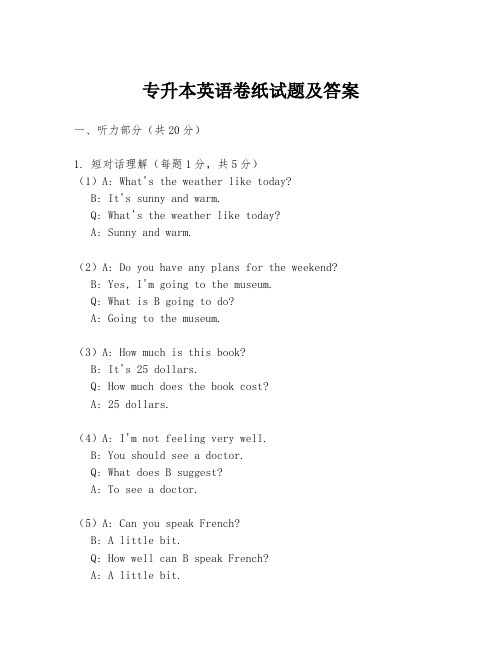
专升本英语卷纸试题及答案一、听力部分(共20分)1. 短对话理解(每题1分,共5分)(1)A: What's the weather like today?B: It's sunny and warm.Q: What's the weather like today?A: Sunny and warm.(2)A: Do you have any plans for the weekend?B: Yes, I'm going to the museum.Q: What is B going to do?A: Going to the museum.(3)A: How much is this book?B: It's 25 dollars.Q: How much does the book cost?A: 25 dollars.(4)A: I'm not feeling very well.B: You should see a doctor.Q: What does B suggest?A: To see a doctor.(5)A: Can you speak French?B: A little bit.Q: How well can B speak French?A: A little bit.2. 长对话理解(每题2分,共10分)(1)A: Hi, I'm looking for a gift for my sister's birthday. B: What about a necklace?A: She already has many. What else do you suggest?B: How about a book?A: That's a great idea. She loves reading.Q: What gift does A decide to buy?A: A book.(2)A: I'm thinking about changing my job.B: Why? You've only been there for a year.A: I feel like I'm not learning anything new.B: Have you talked to your boss about it?A: Not yet, but I will.Q: What is A's reason for wanting to change jobs?A: Not learning anything new.(3)A: I heard you're going to study abroad next year.B: Yes, I'm planning to go to the UK.A: That's exciting! When are you leaving?B: In September.Q: When is B going to study abroad?A: In September.(4)A: I'm having trouble with my computer.B: What seems to be the problem?A: It keeps crashing.B: Have you tried restarting it?A: Yes, but it doesn't help.B: Maybe you should take it to a professional.Q: What does B suggest A should do?A: Take it to a professional.(5)A: I'm so glad I finished my final exams.B: Me too! What are your plans now?A: I'm going to relax for a few days.B: That sounds nice. Any specific plans?A: Just watching movies and sleeping in.Q: What is A's plan after the exams?A: Relaxing by watching movies and sleeping in.二、阅读理解(共30分)Passage 1In recent years, the popularity of online education has grown rapidly. Many people have turned to online courses to learn new skills or to further their education. The convenience and flexibility of online learning have made it an attractive option for busy individuals.Questions:1. What has grown rapidly in recent years?A. Online educationB. Traditional educationC. Sports activitiesD. Travel industryAnswer: A. Online education2. Why have many people turned to online courses?A. To watch moviesB. To learn new skillsC. To go shoppingD. To meet friendsAnswer: B. To learn new skills3. What are the advantages of online learning mentioned in the passage?A. Low cost and high qualityB. Convenience and flexibilityC. Personal interaction and group studyD. Strict schedules and high standardsAnswer: B. Convenience and flexibilityPassage 2Traveling is a great way to experience new cultures and broaden one's horizons. It allows individuals to step out of their comfort zones and learn about the world from a different perspective. Many people find that traveling enriches their lives and provides them with unforgettable memories.Questions:1. What is one of the benefits of traveling according to the passage?A. Saving moneyB. Experiencing new culturesC. Staying in one placeD. Avoiding challengesAnswer: B. Experiencing new cultures2. What does traveling allow individuals to do?A. Stay in their comfort zonesB. Learn about the world from a different perspectiveC. Focus solely on workD. Avoid meeting new peopleAnswer: B。
专升本真题及答案英语
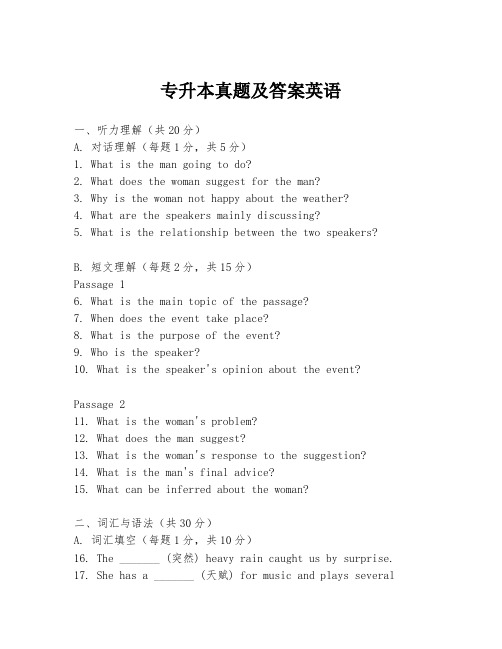
专升本真题及答案英语一、听力理解(共20分)A. 对话理解(每题1分,共5分)1. What is the man going to do?2. What does the woman suggest for the man?3. Why is the woman not happy about the weather?4. What are the speakers mainly discussing?5. What is the relationship between the two speakers?B. 短文理解(每题2分,共15分)Passage 16. What is the main topic of the passage?7. When does the event take place?8. What is the purpose of the event?9. Who is the speaker?10. What is the speaker's opinion about the event?Passage 211. What is the woman's problem?12. What does the man suggest?13. What is the woman's response to the suggestion?14. What is the man's final advice?15. What can be inferred about the woman?二、词汇与语法(共30分)A. 词汇填空(每题1分,共10分)16. The _______ (突然) heavy rain caught us by surprise.17. She has a _______ (天赋) for music and plays severalinstruments.18. The _______ (观点) of the committee were divided on the issue.19. He is a _______ (诚实的) person and always tells thetruth.20. The _______ (影响) of the new policy will be felt in the coming months.B. 语法填空(每题1分,共10分)21. I don't think it's a good idea to go out in this weather, _______?22. The book was so interesting that he read it _______ he realized it was midnight.23. _______ more attention, the problem could have been avoided.24. She is _______ to win the competition, I'm sure.25. _______ he is very old, he is still very active.C. 完形填空(每题1分,共10分)[文章略]26-35. [根据文章内容选择适当的词汇填入空白处]三、阅读理解(共30分)A. 阅读理解选择题(每题2分,共20分)Passage 136. What is the main idea of the passage?37. According to the passage, what is the author's view onthe subject?38. What does the author suggest as a solution to the problem?39. What can be inferred from the passage?40. What is the best title for the passage?Passage 241. Who is the intended audience of the passage?42. What is the purpose of the passage?43. What is the author's opinion about the topic?44. What is the main argument presented in the passage?45. What conclusion does the author draw?B. 阅读理解简答题(每题3分,共10分)Passage 346. What is the main topic of the passage?47. What are the key points discussed in the passage?48. What is the author's recommendation?49. What is the significance of the passage?50. What can be learned from the passage?四、翻译(共10分)51. 将下列句子从中文翻译成英文(5分)- 他决定放弃这份工作,因为他不喜欢长时间工作。
专升本英语试题及答案解析
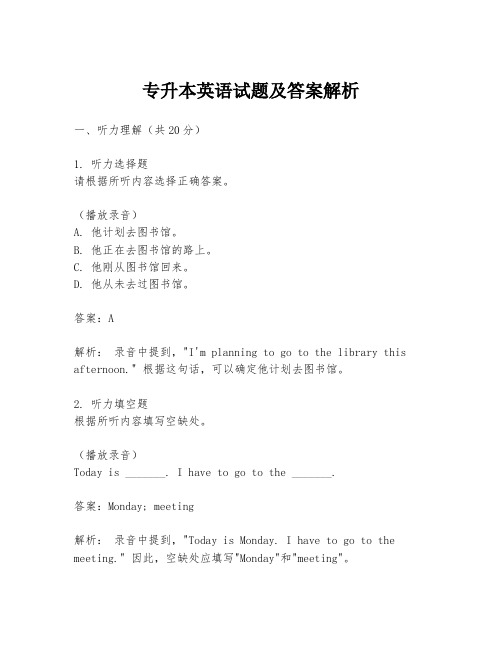
专升本英语试题及答案解析一、听力理解(共20分)1. 听力选择题请根据所听内容选择正确答案。
(播放录音)A. 他计划去图书馆。
B. 他正在去图书馆的路上。
C. 他刚从图书馆回来。
D. 他从未去过图书馆。
答案:A解析:录音中提到,"I'm planning to go to the library this afternoon." 根据这句话,可以确定他计划去图书馆。
2. 听力填空题根据所听内容填写空缺处。
(播放录音)Today is _______. I have to go to the _______.答案:Monday; meeting解析:录音中提到,"Today is Monday. I have to go to the meeting." 因此,空缺处应填写"Monday"和"meeting"。
二、阅读理解(共30分)3. 阅读理解选择题阅读下面的文章,然后回答问题。
文章:The Importance of Time ManagementTime management is a crucial skill that can help individuals achieve their goals more efficiently. It involves planning and organizing tasks to make the best use of time. Effective time management can lead to increased productivity and reduced stress.问题:What is the main idea of the passage?答案:A. Time management is unimportant.B. Time management can increase productivity and reduce stress.C. Time management is only for individuals with many tasks.D. Time management is not necessary for achieving goals.解析:文章的标题是"The Importance of Time Management",文章中提到,"Time management is a crucial skill that can help individuals achieve their goals more efficiently." 这表明时间管理对于高效实现目标至关重要,因此正确答案是B。
专升本英语考试试题
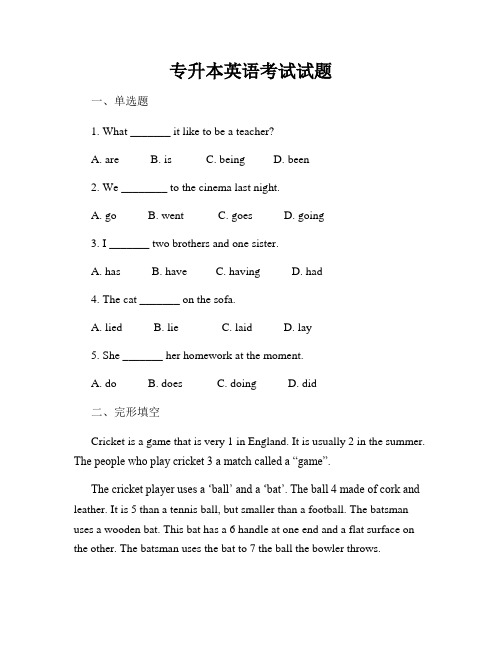
专升本英语考试试题一、单选题1. What _______ it like to be a teacher?A. areB. isC. beingD. been2. We ________ to the cinema last night.A. goB. wentC. goesD. going3. I _______ two brothers and one sister.A. hasB. haveC. havingD. had4. The cat _______ on the sofa.A. liedB. lieC. laidD. lay5. She _______ her homework at the moment.A. doB. doesC. doingD. did二、完形填空Cricket is a game that is very 1 in England. It is usually 2 in the summer. The people who play cricket 3 a match called a “game”.The cricket player uses a ‘ball’ and a ‘bat’. The ball 4 made of cork and leather. It is 5 than a tennis ball, but smaller than a football. The batsman uses a wooden bat. This bat has a 6 handle at one end and a flat surface on the other. The batsman uses the bat to 7 the ball the bowler throws.In cricket, the batsman is bowling and tries to hit the ball with the bat. He can hit the ball in any direction. If he hits the ball well, he may run to one side. This is called a “run”. If he hits the ball to the edge of the 8, he scores a ‘four’. If he hits it over the boundary, he scores a ‘six’. The 9 tries to hit the wicket with the ball. The wicket has three 10 and two ‘bails’.Cricket is a 11 game. It is played in all the countries of the former British Empire.1. A. famous B. popular C. interesting D. traditional2. A. play B. played C. playing D. plays3. A. call B. calls C. called D. calling4. A. was B. is C. has D. were5. A. bigger B. biggester C. biggerer D. biggier6. A. thick B. thin C. short D. long7. A. beat B. hit C. catch D. play8. A. field B. court C. pitch D. ground9. A. batsman B. bowler C. player D. keeper10. A. stages B. marks C. sticks D. lines11. A. difficult B. easy C. simple D. hard三、阅读理解Passage 1Mark Twain, the famous American writer, was born in 1835. He wrote many books. One of his books is Tom Sawyer, in which Tom and his friends have many interesting adventures. Another famous book of his is Huckleberry Finn.Twain wrote some books about the people from the South, including something about his own boyhood. Other books of his were about life on the Mississippi River and the Wild West.Twain liked to make jokes. He made jokes about all kinds of things and wrote them in newspapers. He was a good speaker, too. He often gave funny speeches.Twain was a very good writer. He knew how to write interesting stories, and he wrote in simple and clear English.1. Mark Twain _______.A. was an English writerB. was an Australian writerC. was an American writerD. was a Canadian writer2. The book Tom Sawyer was written by _______.A. an American writerB. an Australian writerC. a Canadian writerD. a British writer3. Mark Twain was born in _______.A. 1853B. 1953C. 1835D. 19354. Mark Twain liked to _______.A. make jokes about all kinds of thingsB. read booksC. listen to musicD. watch TV5. Mark Twain was a very good writer because he _______.A. liked to make jokesB. wrote in simple and clear EnglishC. liked to read booksD. gave funny speechesPassage 2My name is Jack. I am eleven years old, and I am a student in Grade 6 at Sunshine Elementary School.Last Sunday, my parents and I went to the park. The park was very beautiful. There were many flowers and trees. We saw a lot of birds in the trees, and we also saw some fish in the pond.I like to play football. I can play football very well. My favorite football player is Lionel Messi. I want to be a great football player like him in the future.In my free time, I like to read books. I have many books in my room. I like to read storybooks, especially adventure stories.1. Jack is _______ years old.A. 10B. 11C. 12D. 132. Jack is a student at _______.A. Sunshine High SchoolB. Sunshine Middle SchoolC. Sunshine Primary SchoolD. Sunshine Elementary School3. Jack went to the park last _______.A. SaturdayB. SundayC. MondayD. Tuesday4. Jack can play football _______.A. very badlyB. very wellC. very slowlyD. very quickly5. In his free time, Jack likes to _______.A. play footballB. watch TVC. read booksD. do homework四、写作请你用英语写一篇短文介绍你的家庭成员,包括父母和兄弟姐妹。
历年专升本英语试题及答案
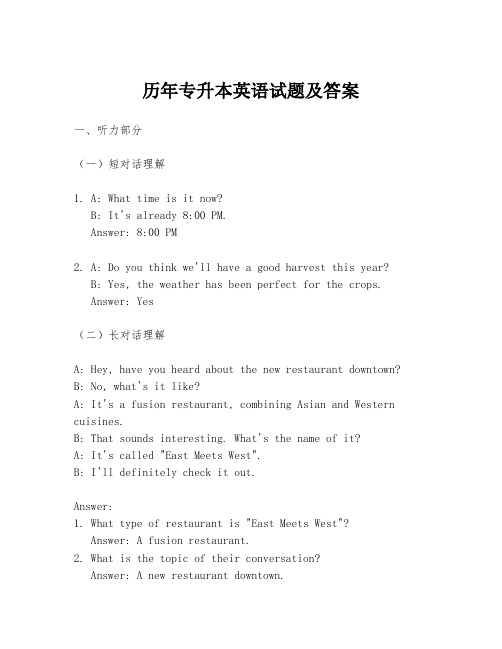
历年专升本英语试题及答案一、听力部分(一)短对话理解1. A: What time is it now?B: It's already 8:00 PM.Answer: 8:00 PM2. A: Do you think we'll have a good harvest this year? B: Yes, the weather has been perfect for the crops.Answer: Yes(二)长对话理解A: Hey, have you heard about the new restaurant downtown? B: No, what's it like?A: It's a fusion restaurant, combining Asian and Western cuisines.B: That sounds interesting. What's the name of it?A: It's called "East Meets West".B: I'll definitely check it out.Answer:1. What type of restaurant is "East Meets West"?Answer: A fusion restaurant.2. What is the topic of their conversation?Answer: A new restaurant downtown.二、阅读理解(一)阅读理解APassage 1In recent years, online education has become increasingly popular. It allows students to learn at their own pace and from the comfort of their own homes.Questions:1. What is the main topic of the passage?Answer: Online education.2. What is one advantage of online education mentioned in the passage?Answer: Learning at one's own pace and from home.(二)阅读理解BPassage 2The invention of the computer has revolutionized the way we live and work. It has made information processing faster and more efficient.Questions:1. What is the main idea of the passage?Answer: The impact of the computer on our lives and work.2. What is one benefit of the computer mentioned?Answer: Faster and more efficient information processing.三、完形填空In a small village, there lived a wise old man. He was known for his ability to solve problems. One day, a young boy approached him with a puzzle.[Here, the text would continue with a passage that has missing words, and candidates would be required to fill in the blanks with the correct word from a list of options.]四、翻译(一)英译汉Translate the following sentence into Chinese:"The rapid development of technology has changed our lives in many ways."Answer: 技术的快速发展在许多方面改变了我们的生活。
专升本英语试题及答案

专升本英语试题及答案一、听力理解(共20分)1. 根据所听对话,选择正确的答案。
A) Mike is going to the library.B) Mike is going to the bookstore.C) Mike is going to the cinema.录音内容:Mike: I need to buy some books for my English class. Where should I go?Jane: You should go to the bookstore.答案:B) Mike is going to the bookstore.2. 根据所听短文,回答以下问题。
What is the main idea of the passage?A) The importance of reading.B) The benefits of traveling.C) The advantages of technology.录音内容:[Short passage about the importance of readingfor personal development and knowledge acquisition.] 答案:A) The importance of reading.二、阅读理解(共30分)阅读下列短文,然后回答问题。
Passage 1In recent years, the popularity of online shopping has surged. People can buy almost everything from the comfort of theirown home without having to physically visit a store.3. What is the main topic of the passage?A) The convenience of online shopping.B) The drawbacks of physical stores.C) The history of online shopping.答案:A) The convenience of online shopping.4. What can be inferred from the passage?A) People prefer shopping online to going to stores.B) Online shopping is becoming less popular.C) People are not interested in shopping.答案:A) People prefer shopping online to going to stores.Passage 2The benefits of regular exercise are well documented. It not only improves physical health but also enhances mental well-being.5. What is the main point of the passage?A) The benefits of exercise.B) The types of exercises available.C) The history of physical fitness.答案:A) The benefits of exercise.6. What does the passage suggest?A) Exercise is only good for physical health.B) Exercise has no impact on mental health.C) Exercise is beneficial for both physical and mental health.答案:C) Exercise is beneficial for both physical and mental health.三、词汇与语法(共20分)7. The correct form of the verb to fill in the blank is "has been."A) The project _______ delayed due to bad weather.B) The project will be delayed due to bad weather.答案:A) The project has been delayed due to bad weather.8. Choose the correct preposition to complete the sentence. She is interested _______ music and painting.A) inB) atC) on答案:A) in四、完形填空(共15分)Read the following passage and fill in the blanks with the most suitable words from the options given.Once there was a young artist who was very talented. He had a dream of becoming famous, but he was not sure how to achieve it.9. A) HoweverB) ThereforeC) BesidesD) Although答案:A) However10. A) successB) failureC) struggleD) progress答案:A) success五、翻译(共15分)Translate the following sentences from English to Chinese.11. The company has decided to expand its business to new markets.公司决定将其业务扩展到新市场。
专升本历年英语试题及答案
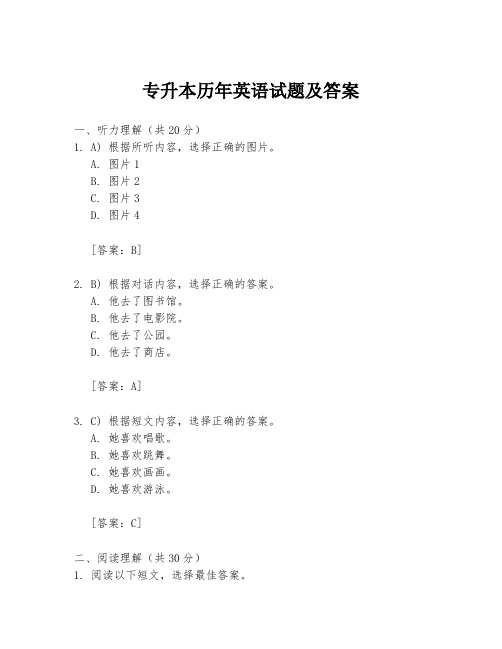
专升本历年英语试题及答案一、听力理解(共20分)1. A) 根据所听内容,选择正确的图片。
A. 图片1B. 图片2C. 图片3D. 图片4[答案:B]2. B) 根据对话内容,选择正确的答案。
A. 他去了图书馆。
B. 他去了电影院。
C. 他去了公园。
D. 他去了商店。
[答案:A]3. C) 根据短文内容,选择正确的答案。
A. 她喜欢唱歌。
B. 她喜欢跳舞。
C. 她喜欢画画。
D. 她喜欢游泳。
[答案:C]二、阅读理解(共30分)1. 阅读以下短文,选择最佳答案。
短文:[短文内容略]问题:a. 根据短文,作者的主要观点是什么?A. 学习英语很重要。
B. 学习英语很有趣。
C. 学习英语很困难。
D. 学习英语很简单。
[答案:A]b. 作者为什么认为学习英语很重要?A. 因为英语是国际语言。
B. 因为英语是商务语言。
C. 因为英语是科学语言。
D. 所有以上选项。
[答案:D]2. 阅读以下短文,选择最佳答案。
短文:[短文内容略]问题:a. 文章主要讨论了什么主题?A. 环境保护。
B. 科技发展。
C. 文化交流。
D. 教育改革。
[答案:A]b. 作者对于该主题的看法是什么?A. 支持。
B. 反对。
C. 中立。
D. 未明确表态。
[答案:A]三、完形填空(共20分)[完形填空内容略]1. 根据上下文,填入合适的单词。
[答案:略]2. 根据上下文,填入合适的短语。
[答案:略]四、翻译(共15分)1. 将下列句子从英语翻译成中文。
- English: "The world is full of beauty, if you just open your heart to see."- Chinese: "世界充满了美丽,只要你打开心扉去发现。
"2. 将下列句子从中文翻译成英语。
- Chinese: "学习一门新语言可以开阔你的视野。
"- English: "Learning a new language can broaden your horizons."五、写作(共15分)1. 根据给定的题目,写一篇不少于100词的短文。
专升本大学英语试题及答案

1(2分)、2Reading ____ the mind only with materials of knowledge; it is thinking that makeswhat we read ours.A、rectifiesB、prolongsC、minimizesD、furnishes参考答案: D2(2分)、2I fell and hurt myself while I ________ basketball yesterday.A、was playingB、am playingC、playD、played参考答案: A3(2分)、2We’ve missed the last bus. I’m afraid we have no ________ but to take a taxi. A、wayB、choiceC、possibilityD、selection参考答案: B4(2分)、Measles(麻疹) ________ a long time to get over.A、spendB、C、takeD、takes参考答案: D5(2分)、2He asked the waiter ________ the bill.A、onB、ofC、forD、after参考答案: C6(2分)、When you go to the doctor he asks you to describe your ____ so that he can make a diagnosis (诊断).A、indicationsB、signsC、symbolsD、symptoms参考答案: D7(2分)、2I forgot to return the book to you yesterday. So I _____________today.A、might do itB、must do itC、had to do itD、must have to do it参考答案: B8(2分)、The electric fan has blown away the terrible smell in the hall, ______? A、can't itB、isn't itC、hasn't itD、doesn't it参考答案: C9(2分)、2The boy is not happy at the new school. He has ________ friends there. A、fewB、a fewC、littleD、a little参考答案: A10(2分)、2____ you know, David has been well lately.A、WhichB、AsC、WhatD、When参考答案: B11(2分)、2The garden _______while the Greens were away from home.A、took good care ofB、was taken good careC、was taken good care ofwas taking good care参考答案: C12(2分)、2When father was young, he ______from morning till night.A、was made workB、was made workingC、made to workD、was made to work参考答案: D13(2分)、2He _______ lives in the house where he was born.A、alreadyB、yetC、stillD、ever参考答案: C14(2分)、2Show me your ______hand. Can you move it like that?A、anotherB、the otherC、otherD、the others参考答案: B15(2分)、It was ____ of you not to play the piano while I was having a sleep. A、consideratecarefulC、consideringD、considerable参考答案: A16(2分)、2If Mary _______shopping this afternoon, please ask her to write a shopping list first.A、will goB、goesC、wentD、has gone参考答案: B17(2分)、2I saw that she was in difficulty with all those parcels, so I offered my_____. A、serviceB、moneyC、useD、chance参考答案: A18(2分)、2Nancy is considered to be ________ the other students in her class.A、less intelligentB、the most intelligentC、the most intelligentD、as intelligent as参考答案: D19(2分)、2Hunger could be his only for killing a living thing.A、sensationB、causeC、reasonD、motive参考答案: D20(2分)、2Tom ________ more than twenty pounds on the novel.A、spentB、paidC、costD、took参考答案: A21(2分)、2I won’t make the _______ mistake next time.A、likeB、sameC、nearD、similar参考答案: B22(2分)、2Tom is so talkative. I'm sure you'll soon get tired _______ him.A、ofwithC、atD、on参考答案: A23(2分)、2A pair of spectacles ________ what I need at the moment. A、isB、areC、hasD、have参考答案: A24(2分)、2His mother _____alone since his father died.A、livedB、livesC、has livedD、is living参考答案: C25(2分)、2I am not used to speaking ________ public.A、inB、atC、onD、to参考答案: A26(2分)、Wouldn’t it be wise to _____ the possibility of rain before planning the garden party?A、check inB、check throughC、check outD、check on参考答案: C27(2分)、2he one pleasure that Einstein ____ his great fame was the ability it gave him to help others.A、resulted fromB、stirred upC、turned outD、derived from参考答案: D28(2分)、2If the doctor had been available, the child ____________.A、would not dieB、could not have diedC、might not dieD、should not have died参考答案: B29(2分)、2It was well known that Thomas Edison _____ the electric lamp.A、discoveredB、inventedfoundD、developed参考答案: B30(2分)、What ___the population of the USA?A、isB、areC、haveD、has参考答案: C31(2分)、2You've caught a cold. You'd better _______to school.A、goB、to goC、not goD、not to go参考答案: C32(2分)、2Could you tell us _______her aunt will stay here?A、thatB、whatC、how longD、where参考答案: C33(2分)、Australia is one of the few countries ____ people drive on the left of the road.whichB、thatC、whereD、on which参考答案: B34(2分)、2It's reported that a new hospital _____________here next year.A、would be set upB、was going to set upC、will be set upD、is going to set up参考答案: C35(2分)、2We were all surprised when he made it clear that he _____________office soon. A、leavesB、would leaveC、leftD、had left参考答案: B36(2分)、2I didn’t know what to do, but then an idea suddenly ________ to me.A、appearedB、happenedC、occurredD、emerged参考答案: C37(2分)、2The coming of the railways in the 1830s ____ our society and economy. A、transferredB、transformedC、transmittedD、transported参考答案: B38(2分)、2I don’t know _______ to deal with such matter.A、whatB、howC、whichD、/参考答案: B39(2分)、2We'll go for a picnic if it ________tomorrow.A、isn't going to rainB、won't rainC、doesn't rainD、isn't raining参考答案: C40(2分)、2Every morning Mr. Smith takes a ______to his office.A、20 minutes walkB、20 minute's walk20-minutes walkD、20-minute walk参考答案: D41(2分)、2He _______ driving me home, even though I told him I lived nearby.A、insisted onB、insisted atC、insisted thatD、insisted in参考答案: A42(2分)、2She wonders ____will happen to her private life in the future.A、thatB、itC、thisD、what参考答案: D43(2分)、2The rain was heavy and ____ the land was flooded.A、consequentlyB、continuouslyC、constantlyD、consistently参考答案: A44(2分)、2Your advice would be ___ valuable to him, who is at present at his wits’ end.exceedinglyB、excessivelyC、extensivelyD、exclusively参考答案: A45(2分)、2We c ame f inally _________ the conclusion that she has been telling lies all the time. A、ofB、intoC、toD、at参考答案: C46(2分)、2The workers are busy ____models for the exhibition.A、to makeB、with makingC、being makingD、making参考答案: D47(2分)、________ you are leaving tomorrow, we can have dinner together tonight.A、SinceB、WhileC、ForD、Before参考答案: B48(2分)、2You had better ________ a doctor as soon as possible.A、seeingB、sawC、seeD、seen参考答案: C49(2分)、2Do you know ______at the bus stop?A、whom they are waiting forB、who they are waitingC、whom are they waiting forD、who are they waiting参考答案: A50(2分)、2This is the first draft of the book. Please feel perfectly free to ____ on it. A、copeB、complainC、commentD、VVV参考答案: C 单纯的课本内容,并不能满足学生的需要,通过补充,达到内容的完善教育之通病是教用脑的人不用手,不教用手的人用脑,所以一无所能。
专升本英语全国试题及答案
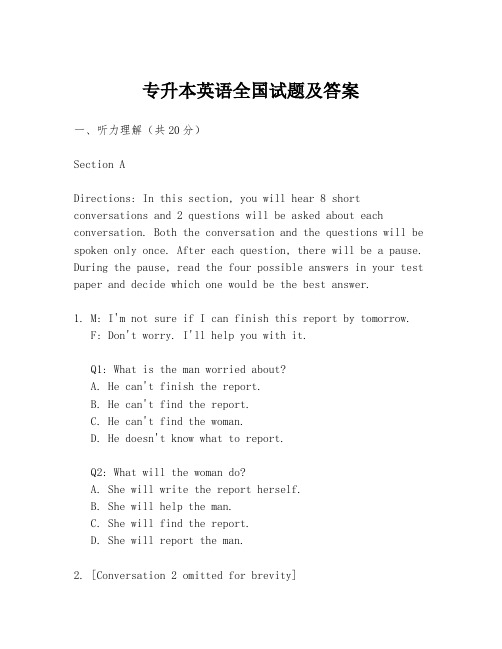
专升本英语全国试题及答案一、听力理解(共20分)Section ADirections: In this section, you will hear 8 short conversations and 2 questions will be asked about each conversation. Both the conversation and the questions will be spoken only once. After each question, there will be a pause. During the pause, read the four possible answers in your test paper and decide which one would be the best answer.1. M: I'm not sure if I can finish this report by tomorrow. F: Don't worry. I'll help you with it.Q1: What is the man worried about?A. He can't finish the report.B. He can't find the report.C. He can't find the woman.D. He doesn't know what to report.Q2: What will the woman do?A. She will write the report herself.B. She will help the man.C. She will find the report.D. She will report the man.2. [Conversation 2 omitted for brevity]...8. [Conversation 8 omitted for brevity]Section BDirections: In this section, you will hear 3 short passages. After each passage, you will hear some questions. Both the passage and the questions will be spoken twice, but the answers will be provided only once. After you hear a question, read the four possible answers in your test paper and decide which one would be the best answer.1. Passage 1: [Passage content omitted for brevity]Q1: What is the main idea of the passage?A. [Answer 1]B. [Answer 2]C. [Answer 3]D. [Answer 4]Q2: What does the speaker mainly discuss?A. [Answer 1]B. [Answer 2]C. [Answer 3]D. [Answer 4]2. Passage 2: [Passage content omitted for brevity]3. Passage 3: [Passage content omitted for brevity]二、阅读理解(共30分)Passage 1[Passage content omitted for brevity]Questions:21. What is the author's purpose in writing the passage?22. According to the passage, what is the main reason for [specific topic]?23. What can be inferred from the passage about [specific topic]?24. What does the author suggest about [specific topic]? Passage 2[Passage content omitted for brevity]Questions:25. What is the main topic of the passage?26. What does the author mean by [specific term]?27. What is the relationship between [two concepts]?28. What conclusion can be drawn from the passage?Passage 3[Passage content omitted for brevity]Questions:29. What is the author's attitude towards [specific topic]?30. How does the author support the argument that [specific claim]?三、词汇与语法(共20分)Section ADirections: In this section, there are 10 sentences with blanks. For each blank, there are four choices marked A, B, C, and D. Choose the ONE that best completes the sentence.31. The company has recently _______ a new marketing strategy.A. adaptedB. adoptedC. adjustedD. arranged32. [Question 32 omitted for brevity]...40. [Question 40 omitted for brevity]Section BDirections: In this section, there are 10 sentences with grammatical errors. Read each sentence carefully and choosethe best way to correct it.41. If you will have any questions, please let me know.A. If you have any questionsB. If you will have any questionsC. If you had any questionsD. If you would have any questions42. [Question 42 omitted for brevity]...50. [Question 50 omitted for brevity]四、完形填空(共15分)[Complete the passage with the appropriate words or phrases.]51. A. DespiteB. BesidesC. ThereforeD. However52. [Question 52 omitted for brevity]...60. [Question 60 omitted for brevity]五、翻译(共15分)Section ADirections: Translate the following sentences from English to Chinese, ensuring accuracy and fluency.61. The rapid development of technology has changed the way we live.62. [Sentence 62 omitted for brevity]...65. [Sentence 65 omitted for brevity]Section B。
专升本英语真题(含答案)

专升本英语真题(含答案)一、单项选择题(每题2分,共40分)1. — Could you please tell me how to get to the nearest post office?— ________. It's on the opposite of the Bank of China.A. No problemB. Sure, I'd love toC. I'm sorry, I don't knowD. It's my pleasure答案:B2. Tom ________ his glasses and now he can't find them anywhere.A. lostB. has lostC. had lostD. will lose答案:B3. — Excuse me, is this your book?— ________. It's mine.A. Yes, it isB. No, it isn'tC. Yes, it's notD. No, it's mine答案:A4. The teacher asked us ________ so much noise.A. don't makeB. not to makeC. not makeD. to not make答案:B5. — How long have you been a teacher?— ________.A. For two yearsB. Two years agoC. Since two yearsD. Since two years ago答案:A当然,让我们继续完善这份文档。
二、完形填空(每题2分,共20分)阅读下面的短文,从短文后各题所给的四个选项中,选出最佳选项。
Mary was walking home from school one day when she noticed a small, shivering dog beside the road. It lookedlost and hungry. (6) ________ Mary had always loved animals, she decided to help the little dog.She gently approached the dog and (7) ________ it. To her surprise, the dog was very friendly and wagged its tail (8)________. Mary looked around but couldn't see anyone who might be the dog's owner. She decided to take the dog home and (9) ________ it until she could find its owner.6. A. BecauseB. SinceC. AlthoughD. If答案:A7. A. scaredB. caughtC. touchedD. hugged答案:D8. A. sadlyB. slowlyC. wildlyD. proudly答案:C9. A. adoptB. feedC. ignoreD. protect答案:B10. A. searchingB. callingC. askingD. looking答案:D三、阅读理解(每题3分,共30分)阅读下面的短文,根据短文内容回答问题。
专升本英语考试题及答案
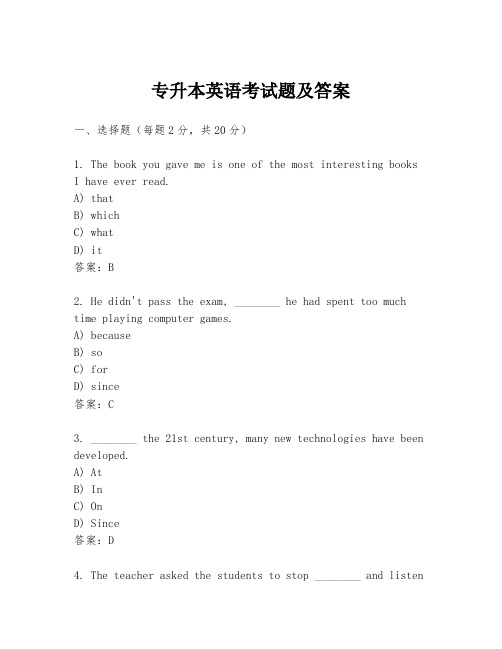
专升本英语考试题及答案一、选择题(每题2分,共20分)1. The book you gave me is one of the most interesting booksI have ever read.A) thatB) whichC) whatD) it答案:B2. He didn't pass the exam, ________ he had spent too much time playing computer games.A) becauseB) soC) forD) since答案:C3. ________ the 21st century, many new technologies have been developed.A) AtB) InC) OnD) Since答案:D4. The teacher asked the students to stop ________ and listento her.A) talkingB) to talkC) talkD) talks答案:A5. ________ he has finished his homework, he can go out to play.A) UnlessB) BeforeC) AfterD) Until答案:C二、填空题(每题2分,共20分)6. If you ________ (not hurry), you will miss the train.答案:don't hurry7. ________ (be) there any milk in the fridge?答案:Is8. She ________ (not go) to the party if she is tired.答案:won't go9. ________ (be) you free tomorrow evening?答案:Are10. The children ________ (play) in the park when it started to rain.答案:were playing三、阅读理解(每题3分,共30分)阅读下面的短文,然后回答11-15题。
专升本英语试题及答案
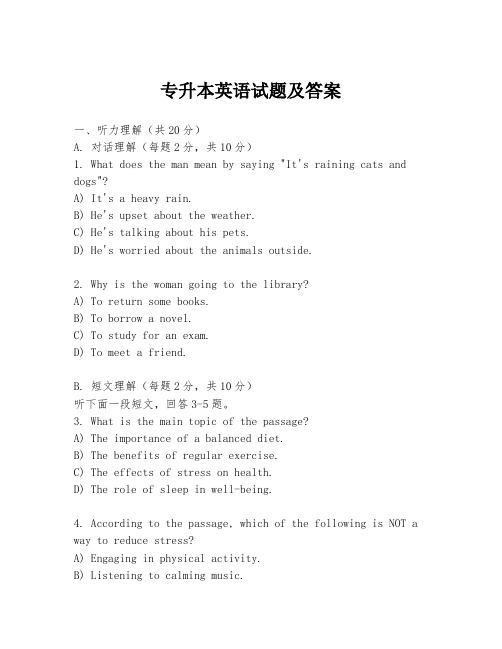
专升本英语试题及答案一、听力理解(共20分)A. 对话理解(每题2分,共10分)1. What does the man mean by saying "It's raining cats and dogs"?A) It's a heavy rain.B) He's upset about the weather.C) He's talking about his pets.D) He's worried about the animals outside.2. Why is the woman going to the library?A) To return some books.B) To borrow a novel.C) To study for an exam.D) To meet a friend.B. 短文理解(每题2分,共10分)听下面一段短文,回答3-5题。
3. What is the main topic of the passage?A) The importance of a balanced diet.B) The benefits of regular exercise.C) The effects of stress on health.D) The role of sleep in well-being.4. According to the passage, which of the following is NOT a way to reduce stress?A) Engaging in physical activity.B) Listening to calming music.C) Consuming a lot of caffeine.D) Practicing deep breathing exercises.5. What does the speaker suggest at the end of the passage?A) Seeking professional help if stress becomes overwhelming.B) Ignoring stress because it's a natural part of life.C) Relying solely on medication to manage stress.D) Avoiding social interactions to reduce stress.二、阅读理解(共30分)A. 选择题(每题3分,共15分)Read the following passage and choose the best answer for each question.Passage 1The rise of digital technology has transformed the way we communicate, work, and learn. It has opened up new opportunities for innovation and has also presented challenges that society must address.6. What is the main idea of the passage?A) The benefits of digital technology.B) The challenges of digital technology.C) The transformation brought by digital technology.D) The need for society to address new challenges.7. What does the author suggest about the impact of digital technology?A) It has only positive effects.B) It has both positive and negative effects.C) It is detrimental to society.D) It is essential for modern life but has no drawbacks.8. What is NOT mentioned as a result of the rise of digital technology?A) Changes in communication methods.B) The need for new skills in the workforce.C) The decline of traditional industries.D) An increase in unemployment rates.B. 填空题(每题3分,共15分)Read the following passage and fill in the blanks with the correct words from the passage.Passage 2Traveling is more than just a way to explore new places; it is an opportunity to experience different cultures and broaden one's perspective. It can be a _9_ experience that enriches your life in many ways.9. A) rewardingB) tiringC) dangerousD) boring10. What does the author believe traveling can do?A) It can make you tired.B) It can be a waste of time.C) It can open your eyes to new things.D) It can be an expensive hobby.三、词汇与语法(共20分)A. 词汇题(每题2分,共10分)11. He was so _12_ by the news that he couldn't sleep allnight.A) excitedB) boredC) annoyedD) tired12. The company is seeking to _13_ its market share by introducing new products.A) increaseB) decreaseC) maintainD) replaceB. 语法题(每题2分,共10分)13. The book was so interesting that he _14_ it in just two days.A) finishedB) has finishedC) had finishedD) was finishing14. If it _15_ tomorrow, we would have to cancel the picnic.A) rainsB) will rainC) is rainingD) rained四、翻译(共20分)A. 汉译英(每题5分,共10分)15. 这个项目的成功在很大程度上取决于团队的合作。
专升本英语真题(含答案)

专升本英语真题(含答案)一、单项选择题1. — Can I help you?— ________.A. No, thanks. I'm just looking.B. Yes, you're right.C. No, I don't think so.D. Yes, I'd like a cup of coffee.答案:A2. ________ the movie last night?— Yes, it was great.A. Did you seeB. Have you seenC. Do you seeD. Will you see答案:A3. Bob ________ his keys, so he couldn't get into his house.A. forgotB. had forgottenC. has forgottenD. forgets答案:B4. The teacher asked the students ________ so much noise.A. not to makeB. not makingC. don't makeD. to not make答案:A5. By the time you graduate, you ________ a rich vocabulary.A. will have built upB. build upC. have built upD. will build up答案:A二、完形填空Once upon a time, there was a wise man who used to go to the ocean to do his writing. He had a habit of walking on the beach before he began his work.One day, as he was walking along the shore, he looked down the beach and saw a human figure moving like a dancer. He smiled to himself at the thought of someone who would dance to the day. So he walked faster to catch up.As he got closer, he saw that it was a young girl and she wasn't dancing, but was reaching down to the shore, picking up something and very gently throwing it into the ocean.He called out, "Good morning! What are you doing?"The young girl paused, looked up, and replied, "Throwing starfish into the ocean.""The sun is up, and the tide is going out. If you don't throw them in, they'll die," she said.The wise man was puzzled. "But young girl, don't you realize that there are miles and miles of beach and starfish all along it? You can't possibly make a difference."The young girl listened politely. Then she bent down, picked up another starfish, and threw it into the sea, past the breaking waves. "It made a difference to that one," she said.1. The wise man went to the ocean to ________.A. danceB. writeC. walkD. play答案:B2. The young girl was ________ when the wise man saw her.A. dancingB. singingC. throwing starfishD. playing答案:C三、阅读理解Passage 1Despite these negative aspects, the Internet also brings numerous benefits. It allows us to stay connected with friends and family, no matter where they are. It provides a platform for learning and sharing knowledge. It even helps businesses to reach a wider audience and grow.1. According to the passage, what is a concern about the Internet?A. It causes loneliness and isolation.B. It improves reallife relationships.C. It increases selfesteem.D. It makes people more productive.答案:A2. Which of the following is NOT mentioned as a benefit of the Internet?A. Staying connected with friends and family.B. Learning and sharing knowledge.C. Helping businesses grow.D. Improving physical health.答案:DPassage 2One solution to these challenges is the development of smart transportation systems. These systems use advancedtechnologies to improve the efficiency and effectiveness of public transportation. For example, realtime data can be used to manage traffic flow and reduce congestion. Electric vehicles can be introduced to decrease pollution.In addition, smart transportation systems can provide users with more personalized services. With the help of mobile apps, passengers can receive updates on bus and train schedules, find the best routes, and even pay for their fares digitally.1. What is the main idea of the second passage?A. Public transportation is no longer needed.B. Smart transportation systems can solve public transportation issues.C. Public transportation is the only solution to traffic congestion.D. Funding is the biggest challenge for public transportation.答案:B2. Which of the following is a feature of smart transportation systems?A. Increased pollution.B. Higher fares.C. Realtime data management.D. Less frequent services.答案:C四、翻译1. 许多学生发现管理时间是他们面临的最大挑战之一。
专升本英语必考试题及答案

专升本英语必考试题及答案一、阅读理解(共20分)Passage 1:In recent years, the importance of environmental protection has been increasingly recognized. Many countries have implemented various policies to reduce pollution and protect natural resources. For instance, some governments have encouraged the use of renewable energy sources such as solar and wind power. Additionally, there has been a growing trend towards recycling and reducing waste.Questions:1. What is the main idea of the passage?2. What are some of the measures taken by governments to protect the environment?Answers:1. The main idea of the passage is the growing recognition of the importance of environmental protection and the measures taken by governments to address it.2. Some measures taken include encouraging the use of renewable energy sources and promoting recycling and waste reduction.Passage 2:The digital age has transformed the way we communicate.Social media platforms have become an integral part of our daily lives, allowing us to connect with friends and family instantly. However, concerns have been raised about theimpact of social media on mental health, particularly among young people.Questions:1. What is the main topic of the passage?2. What concerns are associated with the use of social media?Answers:1. The main topic of the passage is the transformation of communication in the digital age and the role of social media.2. Concerns include the impact of social media on mental health, especially for young users.二、完形填空(共15分)In today's fast-paced world, time management is a crucial skill. It is important to __1__ your time wisely and __2__your goals. Effective time management can lead to increased productivity and __3__ a better work-life balance.1. A. allocateB. wasteC. save2. A. achieveB. postponeC. set3. A. maintainingB. breakingC. losingAnswers:1. A. allocate2. A. achieve3. A. maintaining三、词汇与语法(共20分)Part A:Choose the best word to fill in the blank.1. Despite the heavy rain, the concert was still held as __.A. plannedB. planC. planningAnswer: A. plannedPart B:Complete the sentence using the correct form of the verb in parentheses.1. She __ (study) at the library when the power went out.Answer: was studying四、翻译(共20分)Translate the following sentences from English to Chinese.1. The company is committed to providing high-quality products and services.2. The rapid development of technology has brought about significant changes in our lives.Answers:1. 该公司致力于提供高质量的产品和服务。
- 1、下载文档前请自行甄别文档内容的完整性,平台不提供额外的编辑、内容补充、找答案等附加服务。
- 2、"仅部分预览"的文档,不可在线预览部分如存在完整性等问题,可反馈申请退款(可完整预览的文档不适用该条件!)。
- 3、如文档侵犯您的权益,请联系客服反馈,我们会尽快为您处理(人工客服工作时间:9:00-18:30)。
A. by B. of C. from D. about
7. We’ll have to get out and walk; the car’s _____ down.
15. The plane _____ from the airport and headed north toward Shanghai.
A. took away B. took up C. took over D. took off
1. Many things ___ impossible in the past are common now.
A. considered B. considering C. to consider D. to be considered
2. The factory is said ___ in a fire two years ago.
11. Not only I but also Ted and Mary ____ fond of watching TV.
A. am B. is C. are D. be
26. Mrs. Lindon has ______ that she is unable to get a job.
A. such small education B. so little education
C. a such little education D. a so small education
A. will take B. would take C. take D. took
30. You would prefer visiting the city to staying at home, _____?
A. won’t you B. do you C. would you D. wouldn’t you
A. efficiency B. efficient C. effect D. affect
20. It is ___ that he will come at midnight.
A. maybe B. lovely C. lively D. likely
16. Being college students of new China, we should never fail to ___ the expectation of the Party and the people.
A. make use of B. give rise to C. get rid of D. live up to
A. filling B. to fill C. fill D. filled
29. His doctor suggested that he ___ a short trip abroad.
27. ___ there is enough snow, we can’t go skiing.
A. Unless B. Because C. As D. However
28. Ellen was absent this morning because she had her tooth ___.
A. should go B. should have gone C. must go D. must have gone
14. The mother ___ the baby from his deep sleep.
A. aroused B. rose C. arose D. raised
21. If you don’t know the word, why don’t you ___ in the dictionary?
A. look at it B. look after it C. look up it D. look it up
23. To succeed in a scientific research project ___.
A. one needs to be persistent
B. persistence is needed
C. one needs be a persistent person
10. He failed the examination three times but ___ he passed.
A. at end B. at finish C. at least D. at last
A. to be destroyed B. to destroy
C. to have destroyed D. to have been destroyed
3. The reason for his success is ____ he worked hard.
A. why B. that C. because D. for
4. By the time the course ends, ___ a lot about Britain.
18. The factory ___ 1 000 buses each year.
A. turns over B. turns on C. turns out D. turns into
19. Mary is the most ___ secretary I’ve ever had.
9. His parents died when he was young, so he was _____ by his aunt.
A. brought up B. brought out C. grown up D. grown
A. fallen B. broken C. run D. gone
8. There was a small _____ of sugar in the cup.
A. amount B. number C. the number D. few
17. You can’t depend on John to ____ some practical suggestions for increasing sales.
A. come up with B. come up to C. come to D. come across
22. Because of my poor English I’m afraid I can’t make myself____.
A. understand B. to understand C. understanding D. understood
注;答案一律写在答题纸上,做在试题上无效
I. Grammar Structure and Vocabulary
Section A (1.5 marks each)
Directions: There are 30 incomplete sentences in this section. For each sentence there are four choices marked A, B, C and D. Choose the ONE answer that best completes the sentence. Then blacken the corresponding letter on the Answer Sheet with a pencil.
C. nor does rubber D. nor rubber does
25. I found ___ to answer all the questions within the time given.
A. no possibility B. there was impossibility C. impossible D. it impossible
A. we’ll learn B. we are learning C. we have learnt D. we’ll have learnt
5. I did not know ___ him or not.
A. whether to help B. if to help C. how to help D. what to help
12. I am sure that ___ you say is true.
A. who B. what C. which D. why
13. The house is dark, the Browns ____ to bed.
D. persistence is what one needs
24. Wood does not conduct electricity; _____.
A. so doesn’t rubber B. also doesn’t rubber
